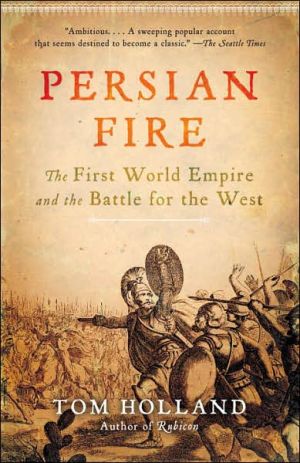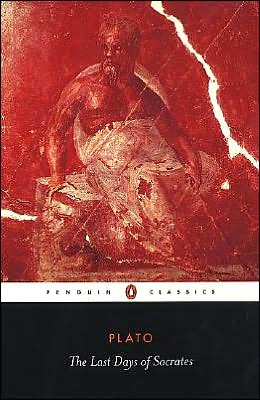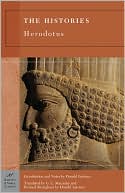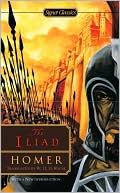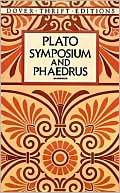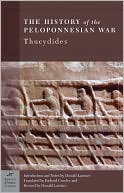Persian Fire: The First World Empire and the Battle for the West
In the fifth century B.C., a global superpower was determined to bring truth and order to what it regarded as two terrorist states. The superpower was Persia, incomparably rich in ambition, gold, and men. The terrorist states were Athens and Sparta, eccentric cities in a poor and mountainous backwater: Greece. The story of how their citizens took on the Great King of Persia, and thereby saved not only themselves but Western civilization as well, is as heart-stopping and fateful as any episode...
Search in google:
In the fifth century B.C., a global superpower was determined to bring truth and order to what it regarded as two terrorist states. The superpower was Persia, incomparably rich in ambition, gold, and men. The terrorist states were Athens and Sparta, eccentric cities in a poor and mountainous backwater: Greece. The story of how their citizens took on the Great King of Persia, and thereby saved not only themselves but Western civilization as well, is as heart-stopping and fateful as any episode in history. Tom Holland’s brilliant study of these critical Persian Wars skillfully examines a conflict of critical importance to both ancient and modern history. Publishers Weekly After chronicling the fall of the Roman Republic in Rubicon, historian Holland turns his attention further back in time to 480 B.C., when the Greeks defended their city-states against the invading Persian empire, led by Xerxes. Classicists will recall such battles as Marathon, Thermopylae and Salamis, which raises the question: why do we need another account of this war, when we already have Herodotus? But just as Victor David Hanson and Donald Kagan have reframed our understanding of the Peloponnesian War by finding contemporary parallels, Holland recasts the Greek-Persian conflict as the first clash in a long-standing tension between East and West, echoing now in Osama bin Laden's pretensions to a Muslim caliphate. Holland doesn't impose a modern sensibility on the ancient civilizations he describes, and he delves into the background histories of both sides with equally fascinating detail. Though matters of Greek history like the brutal social structure of the Spartans are well known, the story of the Persian empire-like the usurper Darius's claim that every royal personage he assassinated was actually an imposter-should be fresh and surprising to many readers, while Holland's graceful, modern voice will captivate those intimidated by Herodotus. (May 2) Copyright 2006 Reed Business Information.
1\ The Khorasan Highway\ Woe to the Bloody City\ The gods, having scorned to mold a world that was level, had preferred instead to divide it into two. So it seemed to those who lived in the Zagros, the great chain of peaks which separates the Fertile Crescent from the upland plateau of Iran. Yet these mountains, though savage, were not impassable. One road did snake across them: the most famous in the world, the Khorasan Highway, which led from the limits of the East to the West, and joined the rising to the setting of the sun. In places, as it climbed through the Zagros Mountains, winding along river beds, or threading between jagged pinnacles and ravines, it might be little more than a footpath—but even that, to those who used it, was a miracle enough. Only a beneficent deity, it was assumed, could ever have fashioned such a wonder. Who, and when, no one really knew for sure,* but it was certainly very ancient—perhaps, some said, as old as time itself. Over the millennia, the Khorasan Highway had been followed by any number of travelers: nomads, caravans—and the armies of conquering kings.\ One empire, in particular, for centuries synonymous with cruel and remorseless invincibility, had sent repeated expeditions into the mountains, dyeing the peaks, in its own ferocious vaunt, "like wool, crimson with blood."(1) The Assyrians, inhabitants of what is now northern Iraq, were city-dwellers, a people of the flat, alluvial plains; but to their kings, warlords who had spread terror and extermination as far as Egypt, the Zagros was less a barrier than a challenge. Themselves the patrons of a proud and brilliant civilization, sumptuous with palaces, gardens and canals, the kings of Assyria had always seen it as their duty to flatten resistance in the wilds beyond their frontiers. This, the wilds being what they were, had proved a calling without limit. Not even with their incomparable war machine could the Assyrians pacify all the mountain tribes—for there were some living in the Zagros who clung to the peaks like birds, or lurked in the depths of thick forests, so backward that they subsisted entirely on acorns, savages hardly worthy of the royal attention. These too, however, with regular incursions, could be taught to dread the name of Assyria, and provide her with the human plunder on which her greatness had come increasingly to depend. Again and again, punitive expeditions would return from the mountains to their native plains, to the sacred cities of Ashur, Nimrud and Nineveh, while in their wake, naked and tethered, followed stumbling lines of captives. Increasingly, the Assyrians had fallen into the habit of moving entire populations, shunting them around their empire, transplanting one defeated enemy into the lands of another, there to live in the houses of the similarly transported, to clear weeds from the rubble, or cultivate the abandoned, smoke-blackened fields.\ These tactics had in the end had due effect. By the late eighth century BC, the reaches of the Khorasan Highway had been formally absorbed into the empire and placed under the rule of an Assyrian governor. "Grovelling they came to me, for the protection of their lives," boasted Assyria's greatest king, Sargon II. "Knowing that otherwise I would destroy their walls, they fell and kissed my feet."(2)\ Not that captives were the only source of wealth to be found in the Zagros. Wild and forested though the mountains were, and often bitter the climate, the valleys were famous for their clover-rich pasture. Over the centuries, and in increasing numbers, these had been attracting tribes who called themselves "Arya"—"Aryans": horse-taming nomads from the plateau to the east.(3) Even once settled, these immigrants had preserved many of their ancestors' instincts, filling the valleys of their new homeland with great herds of long-horned cattle, and preferring, wherever possible, to live in the saddle. The Assyrians, no horse-breeders themselves, would speak in wondering terms of the stud farms of the Zagros, with their "numberless steeds."(4) It was relatively easy for the Assyrian army to cherry-pick these as tribute, for the finest horses, by universal consent, were those bred by the Medes, a loose confederation of Aryan tribes settled conveniently along the Khorasan Highway itself. No wonder the Assyrians came to prize the region. Their mastery of Media,(5) as well as enabling them to control the world's most important trade route, permitted their armies to develop a new and lethal quality of speed. By the eighth century BC, cavalry had become vital to the ability of Assyria to maintain her military supremacy. The tribute of horses from the mountains had become the lifeblood of her greatness. The richest silver mine could not have been more precious to her than the stud farms of the Zagros.\ And yet, in Assyria's supremacy lay the seeds of its own downfall. The mountains were a mishmash of different peoples, Aryans and aboriginals alike, with even the Medes themselves ruled by a quarrelsome multitude of petty chieftains. Foreign occupation, however, by imposing a unitary authority upon the region, had begun to encourage the fractious tribes to cohere. By the 670s BC, menaced by the shadowy leader of a formal Median union, the Assyrians' hold on the Zagros started to slip alarmingly. Tribute dried up as its collection became ever more challenging. Open revolts blazed and spread. Over the following decades, the scribes of the Assyrian kings, employed to keep a record of the victories of their masters, ceased to make mention of Media at all.\ This silence veiled an ominous development. In 615 BC, a king who claimed sovereignty over all the clan chiefs of the Medes, Cyaxares by name, joined an alliance of the empire's other rebellious subjects and led his troops from their fastnesses against the Assyrians' eastern flank. The effect of this sudden eruption of the mountain men was devastating. After only three years of campaigning, the inconceivable occurred: Nineveh, greatest of all the strongholds of Assyrian might, was stormed and razed. To the amazement—and joy—of the empire's subject peoples, "the bloody city" was pulverized beneath the hooves of the Median cavalry. "Horsemen charging, flashing sword and glittering spear, hosts of slain, heaps of corpses, dead bodies without end—they stumble over the bodies!"(6)\ Four years later, and all traces of the Assyrian colossus, which for so long had kept the Near East in its shadow, lay obliterated. To the victors, naturally, had fallen the spoils. Media, precipitately elevated to the rank of great power, seized a huge northern swath of the defeated empire. Her kings, no longer small-time chieftains, could now indulge themselves in the occupations proper to their newly won status—throwing their weight around and scrapping with other great powers. In 610 BC, the Medes swept into northern Syria, burning and looting as they went. In 585, they went to war with the Lydians, a people based in the west of what is now Turkey, and only a solar eclipse, manifesting itself over the battlefield, finally persuaded the two sides to draw back. By the terms of a hurriedly patched-up treaty, the Halys, a river flowing midway between Media and Lydia, was established as the boundary between the rival empires, and for the next thirty years, throughout the Near East, peace, and the balance of power, were maintained.(7)\ Not that the new king of Media, Astyages, had any intention of hanging up his saddle. Undistracted now by war with other major empires, he turned his attention instead to the wilds north and east of his kingdom, far distant from the cockpit of the Fertile Crescent. Leading an expedition into the badlands of Armenia and what is now Azerbaijan, he was following in the footsteps of the Assyrian kings, teaching the savages beyond his frontiers to fear his royal name.(8) In other ways, too, the traditions of the great monarchies of the Near East, so alien to those of his own people, still semi-tribal and nomadic as they were, appear to have whetted the ambitions of the Median king. After all, a ruler of Astyages' stature, no less powerful than the King of Lydia or the Pharaoh of Egypt, could hardly be expected to rule his empire from a tent. What the monarchs of more ancient lands had always taken for granted—a palace, a treasury, a mighty capital—Astyages, naturally, had to have as well: proofs of his magnificence raised in gold and blocks of stone.\ Travelers who made the final ascent through the mountains along the Khorasan Highway would see, guarding the approaches to the Iranian plateau ahead of them, a vision which could have been conjured from some fabulous epic: a palace set within seven gleaming walls, each one painted a different color, and on the two innermost circuits, bolted to their battlements, plates of silver and gold. This was Ecbatana, stronghold of the kings of Media, and already, barely a century after its foundation, the crossroads of the world.(9) Commanding the trade of East and West, it also opened up to its master the whole range of the Zagros, and beyond. Here, for the Median clan chiefs, in particular, was a thoroughly alarming development. The surest guarantee of their freedom from royal meddling, and of the continued factionalism of the kingdom itself, had always been the inaccessibility of their private fiefdoms—but increasingly they found themselves subordinated to the reach of Astyages' court. At one time, before the building of the polychrome palace walls, Ecbatana had been an open field, a free meeting place for the tribes, a function preserved in the meaning of its name: "assembly point." But now those days were gone, and the Medes, who had fought so long to liberate themselves from the despots of Nineveh, found themselves the subjects of a despot nearer to home.\ No wonder that later generations would preserve a memory of Astyages as an ogre. No wonder, either, that when they sought to explain their loss of freedom, the Medes would identify Ecbatana as both a symbol of their slavery, and a cause.(10)\ King of the World\ Astyages, it was said, even amid all the proofs of his greatness, was haunted by prophecies of doom: strange dreams tormented him, warning him of his downfall and the ruin of his kingdom. Such was the value ascribed by the Medes to visions of this kind that a whole class, the Magi, existed to divine what their meaning might be. Skilled in all the arts of keeping darkness at bay, these ritual experts provided vital reassurance to their countrymen, for it was a principle of the Medes, a devout and ethical people, that there was shadow lurking beyond even the brightest light. All the world, it seemed to the Magi, bore witness to this truth. A fire might be tended so that it burned eternally, but there was nowhere, not beside the coolest spring, nor even on the highest mountain peak, where the purity of its flame might not be menaced by pollution. Creation bred darkness as well as the daylight. Scorpions and spiders, lizards, snakes and ants, all crept and seethed, the visible excrescences of a universal shadow. Just as it was the duty of a Magus to kill such creatures wherever he found them, so shadows had to be guarded against when they darkened people's dreams—and especially the nightmares of a king. "For they say that the air is full of spectres, which flow by exhalation, and penetrate into the sight of those with piercing vision."(11) Greatness, like fire, had to be tended with care.\ That a kingdom as powerful as Media, less than a century after its first rise to independence and greatness, might once again be prostrated and subjected to foreign domination must, to many, have seemed implausible. But this, as the Medes themselves had good cause to know, had always been the baneful rhythm of the region's power play: great empires rising, great empires falling. No one kingdom, not even Assyria, had ever crushed all who might wish to see it destroyed. In the Near East, predators lurked everywhere, sniffing the air for weakness, awaiting their opportunity to strike. Ancient states would vanish, new ones take their place, and the chroniclers, in recording the ruin of celebrated kingdoms, might find themselves describing strange and previously unknown peoples.\ Many of these, just like the Medes themselves, were Aryans—nomads who had left little trace of their migrations upon the records of the time. In 843 BC, for instance, the Assyrians had campaigned in the mountains north of their kingdom against a tribe they called the "Parsua"; two centuries later, a people with a very similar name had established themselves far to the south, on the ruins of the venerable kingdom of Anshan, between the lower reaches of the Zagros and the sweltering coastlands of the Gulf. No chronicler, however, could know for sure if they were one and the same.(12) Only by putting down roots, and by absorbing something of the culture of the people they had displaced, had the newcomers finally been able to intrude upon the consciousness of their more sedentary neighbors. These, reluctant to change the habit of centuries, had continued to refer to the region as they had always done; but the invaders, when they spoke of their new homeland, had naturally preferred to call it after themselves. So it was that what had once been Anshan came gradually to be known by a quite different name: Paarsa, Persia, the land of the Persians.(13)\ In 559 bc, while Astyages still ruled in Media, a young man came to the throne of this upstart kingdom. His name was Cyrus, and his attributes included a hook nose, immense ambition and quite limitless ability. From even before his birth, it appeared, he had been marked out for greatness; for it was he—if the stories are to be believed—who had been prophesied as the bane of Median greatness. Astyages was supposed to have seen it all in a dream: a vision of his daughter, Mandane, urinating, the golden stream flowing without cease, until at last the whole of Media had been drowned. When the king had reported this the next morning, his Magian dream-readers had turned pale and warned him that any son of Mandane would be destined to imperil the Median throne. Hurriedly, Astyages had married off his daughter to a vassal, a Persian, the prince of a backward and inconsequential kingdom, hoping in that way to defeat the omen's malice. But after Mandane had fallen pregnant, Astyages had dreamed a second time: now he saw a vine emerging from between his daughter's legs, nor did it stop growing until all Asia was in its shade. Panic-stricken, Astyages had waited for his grandson to be born, and then immediately given orders that the boy be put to death. As invariably happens in such stories, the orders had been defied. The baby had been abandoned on a mountainside, to be discovered and brought up by a shepherd; or perhaps, some said, a bandit; or maybe even a bitch, her teats conveniently swollen with milk. Whatever its precise details, the miraculous nature of such an upbringing had clearly betokened a godlike future for the foundling—and so, of course, it had proved. Cyrus had survived and prospered. Once he had grown to a splendid manhood, his natural nobility of character had served to win him the Persian throne. Thus it was that all the wiles of Astyages had been foiled—and the empire of the Medes been doomed.
\ From Barnes & NobleIn 480 B.C., something inexplicable happened. In the 70 years previous, the Persian Empire had amassed victory after victory, expanding its dominion, which now stretched from India to the shores of the Aegean. His ambitions still unquenched, Persian King Xerxes launched a massive invasion of mainland Greece. Somehow, despite elaborate preparations and seemingly overwhelming military superiority, the Persians were repulsed. As Xerxes watched the battle from the island shores of Salamis, his naval forces were vanquished by the much smaller fleet of the Greek city-states. As Tom Holland's stunning Persian Fire reveals, the battle changed the course of history.\ \ \ \ \ Publishers WeeklyAfter chronicling the fall of the Roman Republic in Rubicon, historian Holland turns his attention further back in time to 480 B.C., when the Greeks defended their city-states against the invading Persian empire, led by Xerxes. Classicists will recall such battles as Marathon, Thermopylae and Salamis, which raises the question: why do we need another account of this war, when we already have Herodotus? But just as Victor David Hanson and Donald Kagan have reframed our understanding of the Peloponnesian War by finding contemporary parallels, Holland recasts the Greek-Persian conflict as the first clash in a long-standing tension between East and West, echoing now in Osama bin Laden's pretensions to a Muslim caliphate. Holland doesn't impose a modern sensibility on the ancient civilizations he describes, and he delves into the background histories of both sides with equally fascinating detail. Though matters of Greek history like the brutal social structure of the Spartans are well known, the story of the Persian empire-like the usurper Darius's claim that every royal personage he assassinated was actually an imposter-should be fresh and surprising to many readers, while Holland's graceful, modern voice will captivate those intimidated by Herodotus. (May 2) Copyright 2006 Reed Business Information.\ \ \ Library JournalPortrayed mainly as a clash of civilizations, the invasion of ancient Greece by the Persians in 480 B.C.E. is given a fresh look in this account by Holland (Rubicon: The Last Years of the Roman Republic). Much of the book focuses on the history of both cultures before the wars, including the founding of major players Sparta, Athens, and Persia. Although the subject is an old one, Holland makes the story of Greece's repulsion of the immense forces of Xerxes seem relevant to the current clash between East and West. Holland draws many parallels with present-day conflicts, referring, for instance, to the Persian belief that the Greeks were in violation of the path of righteousness as dictated by the Persian gods and therefore deserved the destruction that was planned for them. Most readers will not have any difficulties in seeing the implicit comparisons that Holland makes between the Persians and present-day religious extremists. Holland tells a story in an efficient and engaging manner, with clear and concise prose enhanced by a time line and endnotes. Recommended for all public and academic libraries.-Sean Fleming, Lebanon Pub. Libs., NH Copyright 2006 Reed Business Information.\ \ \ \ \ Kirkus ReviewsWhy do they hate us? That's what Herodotus wanted to know, and this lively history of the Persian Wars ventures a few answers. Indeed, writes historian/novelist Holland (Rubicon, 2004, etc.), if history begins with Herodotus, then that question is the foundation of history. "Why, he wondered, did the peoples of East and West find it so hard to live in peace?" Herodotus thought it might have had something to do with the business of kidnapping princesses, or the savage attacking of Troy. Holland takes a longer view, writing of restless tribes of Central Asians and their push-pull migrations, of power-hungry satraps, of great emperors. The first was Cyrus, who dominated all of southwestern Asia. His lieutenant Harpagus seems to have had it in for the Greeks who lived along the coast of what is now western Turkey: "City by city," Holland writes, "he brutally subdued them all," except the lucky ones who fled to Greece and farther westward to Italy and Sicily. The Persians seem to have taken a liking to the things of Greece, and they pushed ever westward, led by the great general Xerxes. Cyrus knew of the Greeks; a delegation from the mainland once came to his palace and told him bluntly that they had better leave them alone, or "he would have to answer to those who sent them-the Spartans." The Greeks apparently thought that mention of the Spartans was enough, but Cyrus and company were undeterred-and, to their sorrow, they learned their lesson in battles at places like Marathon, Salamis and Thermopylae. Holland's descriptions of these epochal battles are suitably stirring, and if his East-versus-West notion is just a touch anachronistic, it points to all the misunderstandings, ambition andignorance that have characterized that struggle ever since. A welcome popularization of ancient history, with a nicely vengeful cliffhanger of an ending that begs for a sequel.\ \
